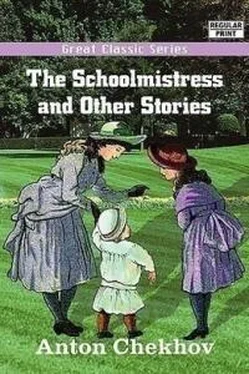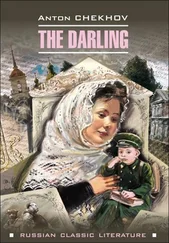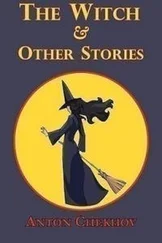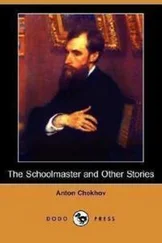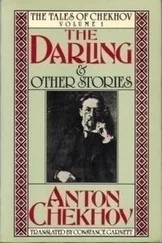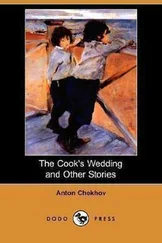It was just as nasty in the best house as in the worst. Here there were just the same looking–glasses and pictures, the same styles of coiffure and dress. Looking round at the furnishing of the rooms and the costumes, Vassilyev realized that this was not lack of taste, but something that might be called the taste, and even the style, of S. Street, which could not be found elsewhere—something intentional in its ugliness, not accidental, but elaborated in the course of years. After he had been in eight houses he was no longer surprised at the color of the dresses, at the long trains, the gaudy ribbons, the sailor dresses, and the thick purplish rouge on the cheeks; he saw that it all had to be like this, that if a single one of the women had been dressed like a human being, or if there had been one decent engraving on the wall, the general tone of the whole street would have suffered.
"How unskillfully they sell themselves!" he thought. "How can they fail to understand that vice is only alluring when it is beautiful and hidden, when it wears the mask of virtue? Modest black dresses, pale faces, mournful smiles, and darkness would be far more effective than this clumsy tawdriness. Stupid things! If they don't understand it of themselves, their visitors might surely have taught them…."
A young lady in a Polish dress edged with white fur came up to him and sat down beside him.
"You nice dark man, why aren't you dancing?" she asked. "Why are you so dull?"
"Because it is dull."
"Treat me to some Lafitte. Then it won't be dull."
Vassilyev made no answer. He was silent for a little, and then asked:
"What time do you get to sleep?"
"At six o'clock."
"And what time do you get up?"
"Sometimes at two and sometimes at three."
"And what do you do when you get up?"
"We have coffee, and at six o'clock we have dinner."
"And what do you have for dinner?"
"Usually soup, beefsteak, and dessert. Our madam keeps the girls well. But why do you ask all this?"
"Oh, just to talk…."
Vassilyev longed to talk to the young lady about many things. He felt an intense desire to find out where she came from, whether her parents were living, and whether they knew that she was here; how she had come into this house; whether she were cheerful and satisfied, or sad and oppressed by gloomy thoughts; whether she hoped some day to get out of her present position…. But he could not think how to begin or in what shape to put his questions so as not to seem impertinent. He thought for a long time, and asked:
"How old are you?"
"Eighty," the young lady jested, looking with a laugh at the antics of the artist as he danced.
All at once she burst out laughing at something, and uttered a long cynical sentence loud enough to be heard by everyone. Vassilyev was aghast, and not knowing how to look, gave a constrained smile. He was the only one who smiled; all the others, his friends, the musicians, the women, did not even glance towards his neighbor, but seemed not to have heard her.
"Stand me some Lafitte," his neighbor said again.
Vassilyev felt a repulsion for her white fur and for her voice, and walked away from her. It seemed to him hot and stifling, and his heart began throbbing slowly but violently, like a hammer—one! two! three!
"Let us go away!" he said, pulling the artist by his sleeve.
"Wait a little; let me finish."
While the artist and the medical student were finishing the quadrille, to avoid looking at the women, Vassilyev scrutinized the musicians. A respectable–looking old man in spectacles, rather like Marshal Bazaine, was playing the piano; a young man with a fair beard, dressed in the latest fashion, was playing the violin. The young man had a face that did not look stupid nor exhausted, but intelligent, youthful, and fresh. He was dressed fancifully and with taste; he played with feeling. It was a mystery how he and the respectable–looking old man had come here. How was it they were not ashamed to sit here? What were they thinking about when they looked at the women?
If the violin and the piano had been played by men in rags, looking hungry, gloomy, drunken, with dissipated or stupid faces, then one could have understood their presence, perhaps. As it was, Vassilyev could not understand it at all. He recalled the story of the fallen woman he had once read, and he thought now that that human figure with the guilty smile had nothing in common with what he was seeing now. It seemed to him that he was seeing not fallen women, but some different world quite apart, alien to him and incomprehensible; if he had seen this world before on the stage, or read of it in a book, he would not have believed in it….
The woman with the white fur burst out laughing again and uttered a loathsome sentence in a loud voice. A feeling of disgust took possession of him. He flushed crimson and went out of the room.
"Wait a minute, we are coming too!" the artist shouted to him.
"While we were dancing," said the medical student, as they all three went out into the street, "I had a conversation with my partner. We talked about her first romance. He, the hero, was an accountant at Smolensk with a wife and five children. She was seventeen, and she lived with her papa and mamma, who sold soap and candles."
"How did he win her heart?" asked Vassilyev.
"By spending fifty roubles on underclothes for her. What next!"
"So he knew how to get his partner's story out of her," thought Vassilyev about the medical student. "But I don't know how to."
"I say, I am going home!" he said.
"What for?"
"Because I don't know how to behave here. Besides, I am bored, disgusted. What is there amusing in it? If they were human beings—but they are savages and animals. I am going; do as you like."
"Come, Grisha, Grigory, darling…" said the artist in a tearful voice, hugging Vassilyev, "come along! Let's go to one more together and damnation take them!…Please do, Grisha!"
They persuaded Vassilyev and led him up a staircase. In the carpet and the gilt banisters, in the porter who opened the door, and in the panels that decorated the hall, the same S. Street style was apparent, but carried to a greater perfection, more imposing.
"I really will go home!" said Vassilyev as he was taking off his coat.
"Come, come, dear boy," said the artist, and he kissed him on the neck. "Don't be tiresome…. Gri–gri, be a good comrade! We came together, we will go back together. What a beast you are, really!"
"I can wait for you in the street. I think it's loathsome, really!"
"Come, come, Grisha…. If it is loathsome, you can observe it! Do you understand? You can observe!"
"One must take an objective view of things," said the medical student gravely.
Vassilyev went into the drawing–room and sat down. There were a number of visitors in the room besides him and his friends: two infantry officers, a bald, gray–haired gentleman in spectacles, two beardless youths from the institute of land–surveying, and a very tipsy man who looked like an actor. All the young ladies were taken up with these visitors and paid no attention to Vassilyev.
Only one of them, dressed a la Aida, glanced sideways at him, smiled, and said, yawning: "A dark one has come…."
Vassilyev's heart was throbbing and his face burned. He felt ashamed before these visitors of his presence here, and he felt disgusted and miserable. He was tormented by the thought that he, a decent and loving man (such as he had hitherto considered himself), hated these women and felt nothing but repulsion towards them. He felt pity neither for the women nor the musicians nor the flunkeys.
"It is because I am not trying to understand them," he thought. "They are all more like animals than human beings, but of course they are human beings all the same, they have souls. One must understand them and then judge…."
Читать дальше
